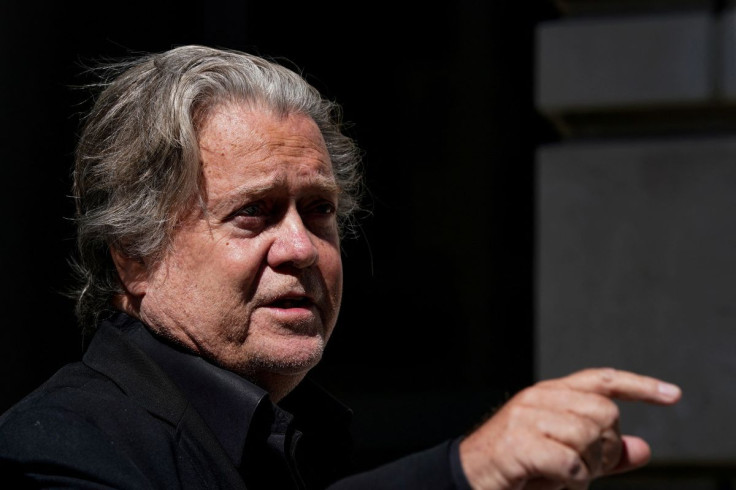Jury Selected In Criminal Trial Of Trump Ex-adviser Bannon

A jury was selected on Tuesday for the criminal trial of Steve Bannon, a prominent former presidential adviser to Donald Trump, paving the way for prosecutors to begin presenting their case on charges of contempt of Congress for defying a subpoena from the committee investigating last year's attack on the U.S. Capitol.
Bannon, 68, is facing two misdemeanor counts after he declined last year to provide testimony or documents to the Democratic-led House of Representatives select committee.
Twelve jurors and two alternates - nine men and five women - were selected from a pool of 22 people deemed qualified to hear the case. The selection of the jury paved the way for prosecutors and Bannon's defense to be able to present opening statements in the trial, possibly later on Tuesday. U.S. District Judge Carl Nichols is presiding.
Many of the jurors told the court on Monday they had not closely followed news coverage of Bannon's case or tracked all of the details from the select committee's televised hearings.
Among the jurors were an internal medicine and pediatrics doctor, a driver for special needs children, an architect, a NASA photographer and a man who told the court he and his wife had been victims of gun violence in Washington.
Nichols had previously ruled that Bannon could not claim he failed to comply with the subpoena because he believed his documents and testimony were protected by a legal doctrine called executive privilege that can keep certain presidential communications confidential.
The judge also previously barred Bannon from telling jurors that he relied upon advice from his lawyer, who told him there were valid legal reasons he could fail to respond to the subpoena.
Nichols left open the door last week for Bannon to offer a defense that he believed the subpoena deadlines were flexible and subject to negotiation. Bannon reversed course this month and said he wanted to testify before a public committee hearing, nearly 10 months after defying the subpoena.
There has been no indication of any plan to have him do so, as the committee likely would want him to first testify in closed sessions in order to cover a wide range of matters. Trump told Bannon he was waiving any executive privilege claim.
Bannon's lawyers on Tuesday said that they need to be able to explain to the jury that Bannon believed executive privilege applied when he defied the committee.
The defense attorneys and prosecutors argued on Tuesday over whether communications between the committee and Bannon's attorneys could be introduced as evidence, and if so, whether they needed to be redacted because the documents make reference to executive privilege.
Trump's supporters stormed the Capitol in a failed effort to block formal congressional certification of his 2020 election loss to Democrat Joe Biden.
As a top adviser to the Republican Trump's 2016 presidential campaign who later served as White House chief strategist, Bannon helped articulate the "America First" right-wing populism and fierce opposition to immigration that helped define Trump's presidency.
Trump last year issued a pardon to Bannon on separate criminal charges of defrauding donors to a private fund-raising effort to boost the former president's project to build a wall along the U.S.-Mexican border.
© Copyright Thomson Reuters {{Year}}. All rights reserved.



















